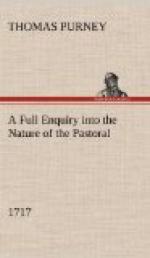But great Care must be taken in this Way. Whereas the Catastrophe in Epick Poetry, is work’d up by violent Means, as Machines, and the like; In Pastoral it must be produced so easy and natural, as to seem to proceed from it self.
Nor must the Change of Fortune be produced by any sudden Contrast, as in most Tragedies it is; since Surprize (unless very weak) is a Fault in Pastoral, tho’ a Beauty in other Poetry.
’Tis also evident that the Ills which a Shepherd falls into, from some slight, and almost inevitable Slip (from which the Moral is form’d) must be infinitely less than those which embarrass a Hero; because Ills must be proportion’d to the Fault; and ’tis plain, the Faults of a Swain are suppos’d to be very minute.
A hundred Observations, like this last, might be made, too inconsiderable to enumerate; but the Poet, when he form’s his Fable, cannot avoid observing ’em. Otherwise, ’tis best he keep to the Simple Fable; which, tho’ a better may, by Industry, be form’d, is far enough from being faulty.
SECT. 3.
What Circumstances or Actions of a Shepherd’s Life are properest for the Poet to go upon.
We cannot be pleas’d with the Description of any State, or Life, which at that time we would not willingly exchange our present State for. Nor is it possible to be pleas’d with any thing that is very low and beggarly. Therefore, methinks, I would raise my Shepherd’s Life to a Life of Pleasure; contrary to the usual Method. For when a Citizen or Person in Business divert’s himself in the Country, ’tis not from seeing the Swains employ’d or at Labour; he visits the Country for the easy and agreeable Retiredness of it; and I believe the Pleasure of seeing a Shepherd folding his Sheep, proceeds from the Prospect of Evening, of the Woods and Fields, and from the Innocence we conceive in the Sheep, and the like; not from the Action of the Shepherd folding them. So of Reapers, we conceive ’em filling the following Year with Plenty; We have, while we see ’em, the Thought of Fulness, and the time when every thing is brought to Perfection; and these, and the like Thoughts, rather raise the Delight of seeing those particular Labours, than the Actions themselves. For we see, that if we behold Sheep, or the like, in a City, tho’ Countrymen are ordering them, we have no such Delight; because there the Silence of Evening, the Prospect of Fields, &c. are not added.
I would therefore omit the Labour of Shepherds, if I could invent a Life more agreeable; but the latter must be form’d from a Man’s Imagination, the former from Observation; and Virgil could draw that almost as well as Theocritus. I wonder the Writers of Pastoral should be so fond of showing their Shepherds Beating Their Ronts, or Scolding With each other, or the like; when they might describe ’em sleeping upon Violets; plaiting rosy Chaplets by a lovely Rivulet; getting Strawberries for a Lass, &c.




